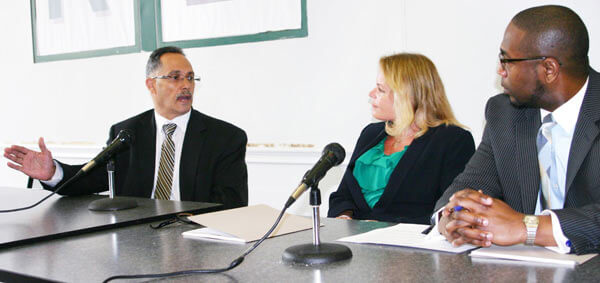By Rich Bockmann
Students at LaGuardia Community College Tuesday heard the firsthand account of a man who was freed from prison with help from another wrongly convicted man as well as his views on the criminal justice system that sent him to jail for nearly a quarter of a century for a murder he did not commit.
“What happens is when you’re not accustomed to the criminal justice system … you really don’t know and understand that process,” William Lopez said at the college’s fifth annual criminal justice conference.
“The first thing we think about is, ‘Wow, the system works. Justice will prevail. The jury system can be fair and impartial.’ But what happens is … the court-assigned attorneys do the minimal amount of service for their client,” he said. “They just kind of go along and let the process go and they really don’t fight for you.”
Lopez was convicted of the 1989 murder of a drug dealer in a Brooklyn crack house based on the testimony of a drug-addicted prostitute who, after the trial, said she had been coerced by prosecutors to falsely identify Lopez as the murderer.
His court-appointed attorney — who was paid $45 an hour as opposed to the approximately $500 an hour a private attorney would earn — did not visit Lopez once during the year he spent on Rikers Island nor did he call any witnesses during the trial.
“So I went to trial on a murder case with no witnesses,” he said incredulously.
As opposed to a public defender, Lopez was appointed what is known as an 18B attorney, a private attorney who is paid by the court with tax dollars to take on a case.
Andre Keeton, a criminal justice professor, said “18B lawyers are generally those who are appointed by judges. They happen to be in court on other cases or perhaps they’re hanging around in the hallways.”
He added, “Some 18B lawyers are excellent attorneys.”
“And some are not,” his colleague, Professor Jennifer Wynn, said.
“And some are not,” Keeton agreed.
“The reason you can be a really bad 18B lawyer and maintain your job is because nobody is watching the lawyers,” Wynn added.
Brooklyn Federal Judge Nicholas Garaufis cited “a series of indolent and ill-prepared defense attorneys” earlier this year when he overturned Lopez’s conviction in a case he called “rotten from Day 1.”
Lopez said he did not hire a private attorney due in part to naivete about what he was up against. Keeton said that despite being presumed innocent until proven guilty, defendants are still at a marked disadvantage.
“There is a great disparity between prosecutors and defense attorneys when it comes to resource availability,” he told the students. “Resources make a huge difference as to what kind of attorney you can be.
Lopez became a jail-house lawyer — working on his case and those of other inmates — and was finally freed after spending 23 1/2 years in prison. He was freed, thanks to help from Jeffrey Deskovic, who was exonerated after 16 years in prison and used money from his settlement with the government to create his own innocence project.
“Actually, to this moment I can’t believe it,” Lopez said, 125 days after getting out. “There’s time during the day I just sort of pinch myself because I don’t believe it.”
Reach reporter Rich Bockmann by e-mail at rbockmann@cnglocal.com or by phone at 718-260-4574.



































